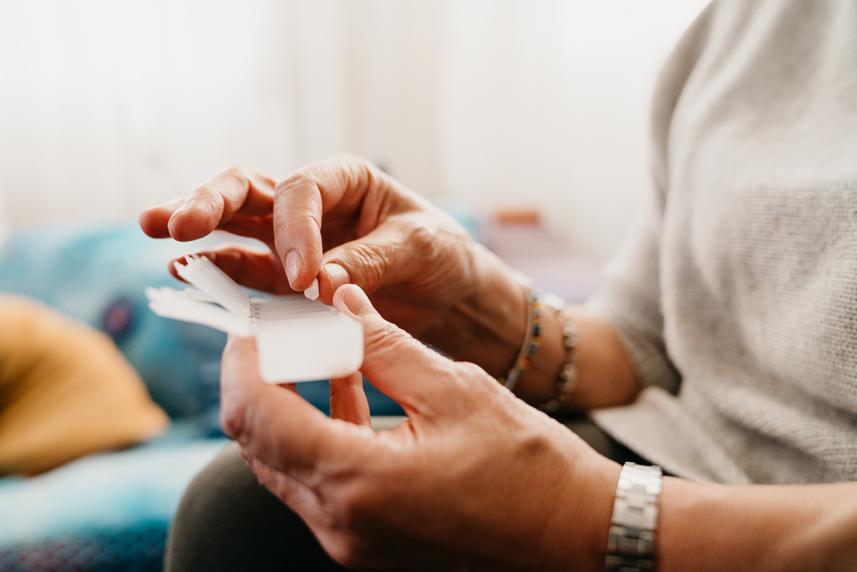
Compare our prices. You might be surprised by how much you can save by transferring to the Optum Store.

Managing all the pills you take each day can be a lot. Check out these simple strategies for keeping up with your prescriptions.
To get healthy and stay strong, your most powerful tool is your ears. Listen to your doctor’s orders. And then follow them to the letter, especially when it comes to your medications.
For people with a chronic condition such as diabetes, heart disease or high blood pressure, those pills are vital. They can make the difference between feeling good and enjoying an active life — or ending up in the hospital. Here’s what you need to know.
Taking your medications as prescribed is called “medication adherence.” That means you take the right dose at the right time every day, you don’t skip pills and you refill your prescriptions.
But too many people don’t stick to their pill schedule. In fact, half of all patients in the U.S. stop taking their medications altogether within a year of being prescribed, according to the Centers for Disease Control and Prevention.
It’s too bad. After all, research shows that taking medications properly leads to fewer complications and better overall health. That’s a big deal for the 129 million Americans who have chronic conditions.
“I see this problem every day in my clinic,” says Amanda Stisher, MD. She’s a spokesperson for the American Academy of Family Physicians. “It’s important for patients to know that taking your medication correctly can help you feel better and keep your condition under control. Your prescriptions can make a big difference in your health.”
Keeping up with your medications isn’t always easy — especially if you take lots of them. But you can do it. “It’s all about habit formation,” says Dr. Stisher. Try these tips to keep on track.
1. Make friends with your pharmacist. You may see different doctors for different conditions. But it’s always a good idea to stick with a single pharmacist. That way, they’ll know exactly what you take and when you need refills.
Your pharmacist can go over your complete list of prescription medications and help you come up with a schedule that’s easy to follow. They may be able to send you text reminders. They can even provide your medications in individual pill packets labeled with the date and time you need to take them.
“Pharmacists are a huge help,” says Dr. Stisher. “They know a lot about these drugs. They can check for interactions and help you get organized.”
Are you spending too much on medication? You might be surprised at what you can save on prescription medications at the Optum Store.
2. Get a pill organizer. While you’re at the pharmacy, pick up a plastic organizer with separate boxes divided by days of the week. Or even by morning and night. It helps to pick a specific day (such as every Sunday) to fill it. “That way, you can see if you’ve missed any doses along the way,” says Dr. Stisher. Or see if your prescription plan offers a reminder service.
(P.S. Read up on what to do with expired medications.)
3. Set an alarm. Chances are, your smartphone is always at your side, so use it. You can set an alarm to remind you when it’s time to take your medications. Or download a smartphone app to help you remember your pills.
4. Go old-school. Grab a calendar and jot down your medications — and the time you need to take them — each day. Then check them off. And don’t forget to mark the date when your prescriptions need to be refilled. Other options: Keep a notebook or use a whiteboard to track your medications.
5. Ask for pill packets. Your pharmacy may be able to put your medications in one pack marked by the day or the time.
6. Connect your medications to your daily activities. Do you brew a pot of coffee every morning to start your day? Do you brush your teeth each night before bed? “Put your medicines next to your coffeepot or beside your toothbrush,” advises Dr. Stisher. “Find something you do at the same time every single day and use that as a reminder.” (Find more tips here.)
7. Ask for help. Let a friend or family member know if you’re struggling to remember to take all your pills. And ask for a helping hand. They may be able to give you a quick call in the middle of the day or shoot you a text in the evening. It’s a great way to keep in touch with the people you love — and to remember to take your pills.

Compare our prices. You might be surprised by how much you can save by transferring to the Optum Store.
Additional sources
Medication statistic: Centers for Disease Control and Prevention (2018). “Overcoming Barriers to Medication Adherence for Chronic Diseases”
Study on taking medications properly: Journal of Primary Care & Community Health (2017). “Improving Chronic Disease Outcomes Through Medication Therapy Management in Federally Qualified Health Centers”
Statistic on chronic disease: Centers for Disease Control and Prevention (2020). “Prevalence of Multiple Chronic Conditions Among US Adults”